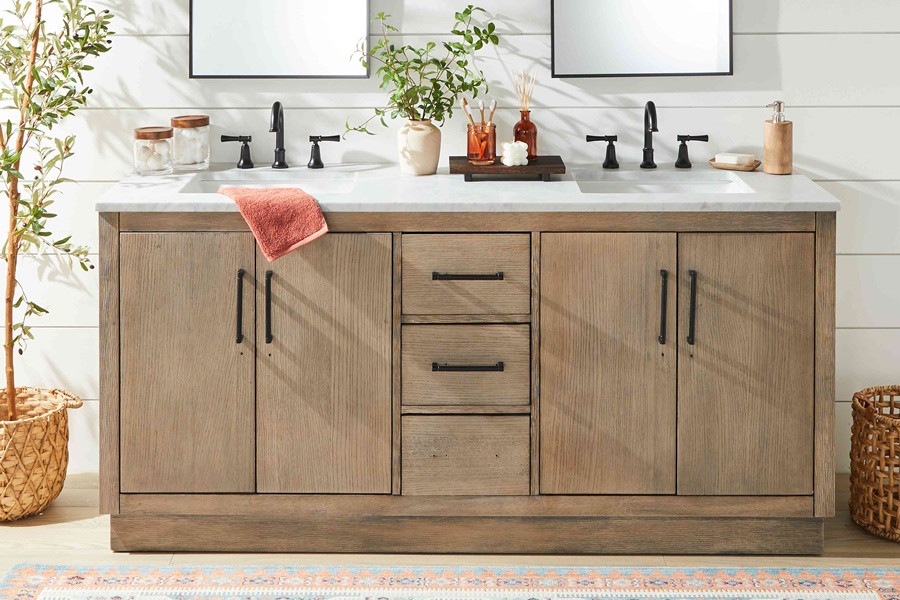Designing a bathroom remodel that balances aesthetics, functionality, and value requires careful planning and a clear strategy. Whether you're upgrading for comfort, preparing to sell, or creating your dream oasis, a well-executed remodel adds significant value to your home. Below, we explore everything necessary to help you master the process of designing your perfect bathroom renovation.
Set Clear Objectives for Your Bathroom Remodel
Before choosing materials or styles, clearly define your remodeling goals. Are you aiming for more storage, a spa-like retreat, or improved accessibility?
Functionality: Do you need double vanities, more storage, or better lighting?
Style: Are you looking for a sleek modern look, rustic farmhouse charm, or timeless elegance?
Budget: Determine how much you're willing to invest, and plan accordingly to avoid overspending.
Timeline: Factor in the time needed to order materials, book contractors, and deal with potential delays.
Evaluate Your Existing Bathroom Layout
Understanding your current layout helps determine how much change is required. Evaluate:
Plumbing positions: Moving plumbing can significantly increase costs.
Natural light sources: Maximize existing windows or consider skylights.
Ventilation: A remodel is the perfect time to install or upgrade ventilation fans to prevent moisture issues.
Structural limitations: Consider wall placements, ceiling height, and door swings.
Design Around Your Lifestyle Needs
Designing a bathroom remodel is not just about aesthetics. It's about aligning with daily routines and household needs:
Families may prioritize durable surfaces, dual sinks, and ample storage.
Couples may opt for luxury features like heated floors or a walk-in shower.
Elderly homeowners may benefit from barrier-free showers, grab bars, and non-slip tiles.
Choose the Right Bathroom Layout
The layout defines how the bathroom functions. Some popular layout options include:
Full Bathroom Layouts
Ideal for master baths or guest suites, they typically feature:
A bathtub or walk-in shower
A toilet
A single or double vanity
Three-Quarter Bathrooms
These include a shower but no tub and are perfect for secondary bathrooms.
Powder Rooms
Compact and ideal for guests, powder rooms usually include:
A toilet
A small vanity or pedestal sink
Select Durable and Stylish Materials
Choosing the right materials is essential for longevity and design cohesion.
Flooring: Porcelain or ceramic tile is water-resistant and durable. Natural stone offers elegance but requires sealing.
Walls: Waterproof paint, tile wainscoting, and full-wall tiling enhance style and protect against moisture.
Vanity Tops: Quartz and granite offer luxury and low maintenance. Solid surface materials are affordable and versatile.
Fixtures: Opt for quality brands with long warranties. Consider water-efficient models to save on utilities.
Incorporate Smart Storage Solutions
Smart storage transforms your bathroom into a clutter-free sanctuary:
Recessed medicine cabinets
Floating vanities with drawers
Built-in shelving
Niches in showers for product storage
Over-the-toilet cabinetry
Efficient storage planning ensures every inch serves a purpose.
Focus on Lighting for Ambiance and Functionality
A multi-layered lighting strategy enhances both functionality and mood:
Ambient lighting: Overhead lights that brighten the entire space.
Task lighting: Focused illumination around mirrors for grooming.
Accent lighting: Under-cabinet or toe-kick lighting adds luxury.
Natural light: Use frosted glass or shades to maintain privacy without sacrificing sunlight.
Choose the Right Color Palette
Color influences the perceived size and mood of your bathroom. Consider:
Light colors: Make small bathrooms appear larger and airier.
Neutral tones: Provide a timeless and calming atmosphere.
Bold accents: Add personality through colored tiles, artwork, or vanities.
Stick to a palette of 2-3 primary colors to keep the space cohesive.
Select Fixtures and Fittings With Care
Your fixtures should complement the overall design and serve your functional needs:
Faucets and showerheads: Choose finishes like brushed nickel, matte black, or polished chrome.
Toilets: Wall-mounted or dual-flush models save space and water.
Bathtubs: Freestanding tubs add elegance, while alcove tubs are efficient for smaller bathrooms.
Showers: Frameless glass showers provide a modern, open feel.
Optimize for Energy and Water Efficiency
Eco-friendly bathrooms lower bills and environmental impact:
Low-flow showerheads and faucets
Dual-flush or high-efficiency toilets
LED lighting
Insulated windows and water heaters
Look for ENERGY STAR and WaterSense labels when selecting appliances and fixtures.
Plan for Future-Proofing and Aging in Place
Design with long-term needs in mind:
Curbless showers for wheelchair access
Grab bars discreetly integrated into the design
Comfort-height toilets
Wide doorways for better mobility
These features increase accessibility and resale value.
Work With Experienced Professionals
Collaborate with skilled professionals to ensure the best results:
Interior designers for layout and aesthetics
Contractors for construction and compliance
Plumbers and electricians for technical installations
Tile specialists for precision and detail
Check licenses, insurance, and references before hiring.
Create a Realistic Timeline
Typical bathroom remodels take 3–6 weeks. Plan for:
Demolition (1–3 days)
Rough-in plumbing and electrical (2–5 days)
Inspections
Flooring, tiling, and drywall (5–10 days)
Fixtures and finishes installation (5–10 days)
Always account for potential delays due to custom orders or unforeseen issues.
Don’t Forget the Finishing Touches
Final details elevate your remodel from good to great:
Coordinated hardware (towel bars, toilet paper holders)
Art and decorative accents
Plants for a natural touch
Luxury textiles like plush towels and bath mats
These elements personalize the space and create a high-end feel.
Conclusion
A bathroom remodel is a transformative investment. With strategic planning, thoughtful design, and quality execution, you can create a space that’s both beautiful and functional for years to come. From layout to lighting, every decision contributes to the final masterpiece.

